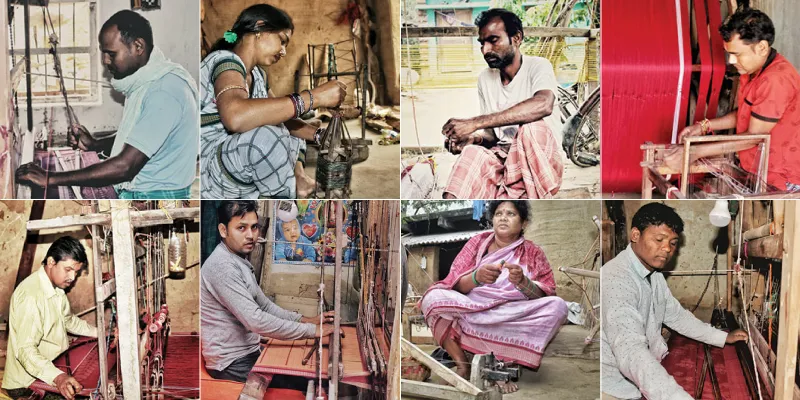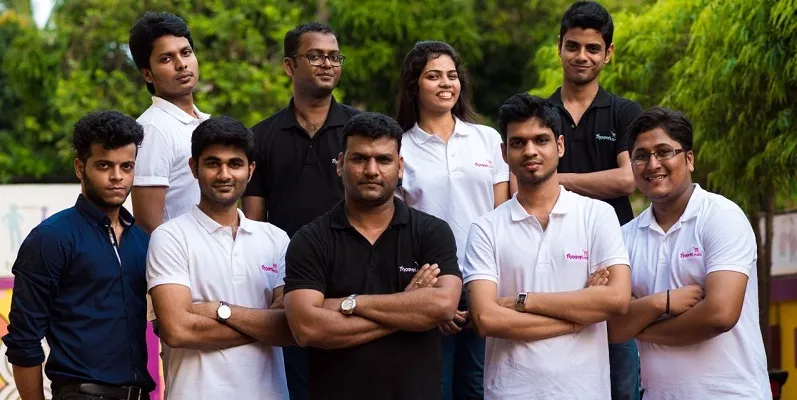StartupBharat: This techie returned to Odisha to work with rural artisans. Now they're selling worldwide
In our latest feature in the StartupBharat series, we take a look at why a techie from Odisha quit is job to return home to Bhubaneswar and work with rural artisans.
From the stone carvings on Konark’s Sun Temple to the exquisite sand art along Puri's beaches, Odias are famous for creating art from literally anything.
And taking their art from the state to a global platform is Rakesh Parida, Founder of Thoomri, a global online marketplace for Indian handlooms and handicrafts. Started in June 2015 in Bhubaneswar, Odisha, Thoomri connects artisans directly with customers. In doing so, it eliminates middle-men and any hidden costs.
“At Thoomri, artists are not cheated. They can see the prices at which their products are being sold, and the process is very transparent,” says Rakesh.

Also read: StartupBharat: These entrepreneurs bring the flavours of India to the whole country
Rakesh set up Thoomri at an initial investment of Rs 30 lakh-Rs 40 lakh. It has so far has on boarded 2,000 artisans from across Odisha covering different verticals like stone craft, handloom fabrics, silver filigree work, palm-leaf paintings, pattachitra, fern-craft, and dokra, among others.
“Indirectly, we are impacting more than 10,000 artisans, and my dream is to onboard all seven million artisans in India,” he adds.
In the first month of its operations, Thoomri sold merchandise worth Rs 16,000. Today, it clocks around Rs 7 lakh a month in revenue, and is targeting an annual turnover of Rs 1 crore by March this year.
Initially bootstrapped, Thoomri has now raised about Rs 20 lakh in funding from a clutch of investors, including social enterprise incubator Villgro, KIIT TBI, DFID UK and TDB of the Government of India.
Santosh Behera, an artist from Odisha's Raghurajpur, told YourStory that he earns up to Rs 18,000 each month by selling his pattachitra and wood art on the Thoomri platform.
"Thoomri se paise ek hi bar mein mil jata hai toh acha lagta hai. Bahar bechte hai toh teen-chaar bar mein pura paisa haath mein aata hai (I get my entire payment at once from Thoomri. When I sell my products outside, the money comes in three to four installments)," he says.
The Thoomri journey
Rakesh comes from a family of politicians. His earliest memories are of the long verandah in his home being lined with people who came to discuss their problems. More often than not, they needed help to improve their economic condition.
Having always wanted to help those who needed it the most, the 32-year-old software engineer decided to quit his job at Phillips in Bengaluru and return to his roots and work with the state's artisans.
"Starting up in Bhubaneswar was cheaper than starting up in a metro,and I wanted to utilise the available resources in my home state first," he adds.
However, as any entrepreneur will tell you, starting up is not easy. Rakesh says that he approached over 15 financial organisations, but none were ready to give him a loan. "I had to bring in my own savings and took loans from friends and family, and eventually even sold my car to start Thoomri," he adds.
That was just the first step.
He then travelled across the length and breadth of Odisha to explore its various art forms. After identifying artisans he could work with, he set up Thoomri and a team of 15 people, including Mahesh Nath, an IIM-graduate. The team includes designers from the National Institute of Fashion Technology and the School of Fashion Technology Bhubaneswar –KIIT University, who work closely with artisans and incorporate certain contemporary elements into the traditional art forms to make them commercially viable.

From then to now
The Odisha-based marketplace for artisans now has warehouses in Pune and Mumbai and will soon start operations in Delhi, Bengaluru and West Bengal.
"We are surveying Maharashtra and Rajasthan to get artists from those regions onboard," Rakesh says.
Thoomri’s products have been sold in China and Singapore and are also exported to the US, and the UK. Germany is another big market.
“About 35 percent of our export orders come from Germany, with Dokra handicrafts being the most popular,” says Rakesh.
The handicraft business
The Indian handicraft sector generates a huge chunk of employment in India. According to an IBEF report, India exported handicrafts worth $2.42 billion in April-November 2018.
An end-to-end presence
The online marketplace for crafts is pretty crowded with players like Festivya, CraftsBazaar, GoCoop, Tijori, Gaatha, and The India Craft House, among others.
However, according to Rakesh, what sets Thoomri apart is its offerings and the business model, which includes both inventory and aggregation.
Under the inventory model, it procures handloom and handicrafts from artisans, store them at its warehouses, and lists them for sale on the website. Thoomri charges a commission of 6-10 percent, besides the shipping charges.
The aggregator model works like a marketplace where Thoomri’s designers work with artisans, help them take pictures of their products,and list them on the website free of cost. When an order is placed, the team works with the artisans to package and ship the products to customers.
Once an order is placed and the payment verified, it is shipped within 24-48 hours. According to Rakesh, the average order size is around Rs 3,500. Delhi remains its biggest market right from when it was set up.
Besides a website, Thoomri also has an app on Play Store and the App Store.

While the bulk of its operations are from the B2C ecommerce platform, Thoomri also has a B2B model,as well as an offline presence through its ‘Experience Store’ in Bhubaneswar, which stocks different handicrafts from across the state. For artisans, the store serves as a showcase of their work.
Thoomri’s B2B orders come from interior designers and corporate offices as well. Hospitals are another B2B customer segment.
“Hospitals have bought a number of paintings and pattachitra art to make their lobbies more colourful and lively,” says Rakesh.
Revenue and growth
For Rakesh, the first two years were spent figuring out how to make artisans tech savvy enough to upload pictures and manage orders. He has, in fact, personally trained many artisans. But that was not really a challenge as compared to the website being hacked soon after it was set up.
“From building the website to the website being hacked, many nights were spent resolving things and learning,” says Rakesh.
Also read: StartupBharat: From solar stoves to 3D printing, four stories of innovation from Gujarat
Future plans: from Odisha, for India and the world
Rakesh says that he wants to open Experience Stores across the big cities in India. "I want handloom from all states in the country to be available at every Experience Stores," he says, adding that he wants to innovate with the existing handlooms too.
“We are in talks with investors and plan to grow our business to all Indian metros in 2019,” he says confidently.











